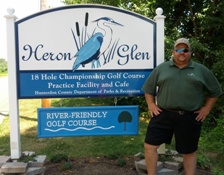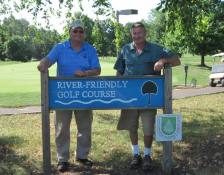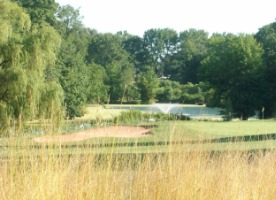Main Content
Putting the “Green” back in Golf: Rutgers Golf Turf School Alumni Elevate Environmental Stewardship
Written by Sandy Crisafulli

For two New Jersey golf courses run by alumni of the Rutgers University Golf Turf Management School, the term “putting green” has taken on new meaning. In fact, Heron Glen Golf Course in Ringoes and Quail Brook Golf Course in Somerset are setting benchmarks for ecological stewardship.

“I’ve always been frustrated with the popular misconception that golf courses are not environmentally friendly,” noted Heron Glen Superintendent Jason Pierce, a 2000 Rutgers Turf School graduate. “I am committed to dispelling this false stereotype.”
To that end, Heron Glen became certified as “River-Friendly” by the New Jersey Water Supply Authority (NJWSA). The certification program focuses on enhancing water quality management and conservation techniques, wildlife and habitat preservation and growth, and education and outreach. “NJWSA customizes the program to be site specific,” Pierce said. “When we got involved, we were pleased to see that Heron Glen already was doing a lot of things right.”
For example, the course has incorporated organic products into its fertilizer program since it opened in 2002, and also uses liquid bio-stimulant products (which naturally increase nutrient efficiency and decrease disease and the need for fertilizer inputs) in treating its turf. To achieve the River-Friendly certification, Heron Glen increased the amount of acreage dedicated to natural habitat, installed bird boxes throughout the property, and incorporated a naturalized wastewater treatment system. Additionally, Heron Glen, which is owned by Hunterdon County and operated by KemperSports, has hosted a series of county-organized bird walks at the course.
Pierce credits the Rutgers Golf Turf Management School for setting the stage for his success in creating green environments. “The integrated pest management class showed us alternatives to controlling certain issues,” Pierce said. “That led to my team establishing a good system at Heron Glen from the outset.”
Pierce has also been involved with the NJWSA’s River-Friendly Golf Course Technical Advisory Committee. “It is great to see people taking this step forward and the watershed authority doing its part to keep these programs alive. It really does make a difference.”

Thomas Grigal and Rich Evans agree. As superintendent and assistant superintendent, respectively, at Quail Brook, they spearheaded that property becoming the very first River-Friendly course in 2005 and the first to be re-certified in 2011. Quail Brook is one of five courses operated by the Somerset County Park Commission, all of which are River-Friendly certified or undergoing certification.
“This program is not just about getting certified and re-certified,” explained Grigal, a 1980 Rutgers Turf School graduate. “It involves ongoing, everyday processes that help the environment. And in addition to the rewards of being good stewards, golf courses with sustainable practices save money on machinery and fuel because they are mowing less property, on water because they are conserving it, and on fertilizer and other chemicals because they are using them minimally.”
Going back to my time at Rutgers, so much of the class focus and material related to being environmentally friendly. I can’t give the teachers enough credit. The knowledge you gain there is fantastic.
– THOMAS GRIGAL

For Grigal and Evans, their “green” aesthetic began developing in school. As Grigal noted, “even going back to my time at Rutgers, so much of the class focus and material related to being environmentally friendly. I can’t give the teachers enough credit. The knowledge you gain there is fantastic.”
Each year, more and more wildlife – from nesting hawks to deer and their fawns – can be found in the no-mow areas at Quail Brook, an indication that the course’s green efforts are working. “We are doing something right,” said Evans, who graduated from the Rutgers Turf School in 2009. “Just to look at the golf course and see the way it’s changing over the years is fantastic. This is a long process and a lot of work, but it gives such a good feeling.”
Just to look at the golf course and see the way it’s changing over the years is fantastic. This is a long process and a lot of work, but it gives such a good feeling.
– RICH EVANs
Kathy Hale, a principal watershed protection specialist with NJWSA, noted that the River-Friendly certification program advances the understanding that environmentally sound courses are quality courses. “The certification also provides an outstanding opportunity for courses to educate their clients,” she said. “New Jersey’s golf courses can really be leaders in environmental stewardship by showing the public how they are making an effort to protect water quality and reduce their environmental impact.”
Hale noted that the NJWSA program complements several other programs designed to recognize and support environmentally conscious golf courses. Other programs include:
- Groundwater Guardian Green Site – Quail Brook has earned this certification from the Groundwater Foundation.
- Audubon Cooperative Sanctuary – Heron Glen received certification in September 2012.

As the public becomes more environmentally conscious, golf course superintendents are being required to demonstrate their knowledge of land and resource management, noted Fran Koppell, former senior program coordinator with the Rutgers Golf Turf Management School. “They need to be proactive, and the instructors in our program are helping to support that,” she said.
At its core, the Rutgers Turf School is dedicated to advancing green careers. The certificate program includes two, 10-week sessions over two years and a 200-hour turf internship (the school also offers a 3-week turf program each January for newcomers or experienced professionals who want to quickly expand their skills). The intensive academic format concentrates on the technical knowledge and management skills required of superintendents.
Since its first graduating class in 1962, thousands of golf turf professionals have completed the Two-Year Program. Among currently active alumni, more than 730 are superintendents and more than 600 are assistant superintendents at golf courses worldwide.

Learn more about Rutgers Professional Golf Turf Management School!
Contact Elizabeth Coogan at 848-932-7643 or 2yearturf@njaes.rutgers.edu.